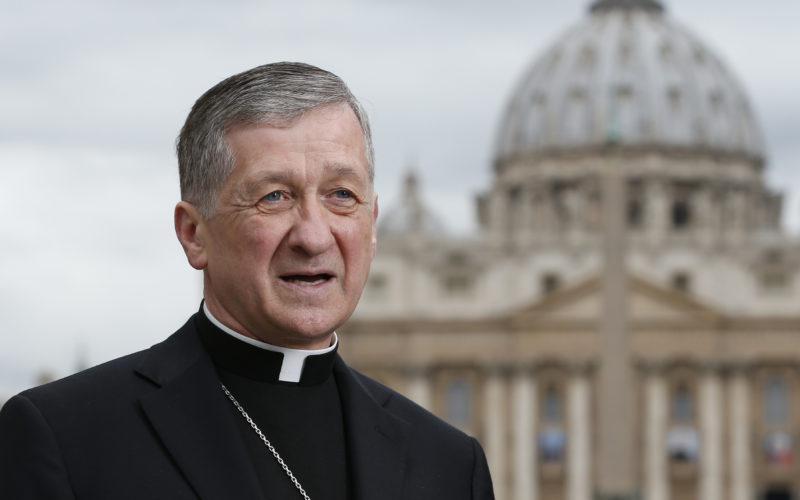|
Cardinal Cupich defends Pope’s record on doctrine and abuse
By Dan Hitchens
Cardinal Blase Cupich has defended Pope Francis’s record and called for a “paradigm shift” in Catholic practice. Addressing the Von Hügel Institute at St Edmund’s College, Cambridge, under the title “Pope Francis’ Revolution of Mercy: Amoris Laetitia as a New Paradigm of Catholicity”, Cardinal Cupich called for “a major shift in our ministerial approach that is nothing short of revolutionary”. The hoped-for “paradigm shift”, the cardinal said, would be from an approach focused on “the automatic application of universal principles” to one which is “continually immersed” in “concrete situations”. Vigorous debate has followed the publication of Amoris Laetitia in April 2016, with different cardinals, bishops and theologians advancing varying interpretations. In a question-and-answer session after the cardinal’s lecture, the historian and philosopher Professor John Rist suggested that “the Pope’s ‘paradigm shift’ should be recognised as an attempt, under cover of offering solutions to genuine social problems in Western society, to impose on the Church radical changes of doctrine”. Cardinal Cupich replied that those with such concerns should ask themselves: “Do we really believe that the Spirit is no longer guiding the Church?” Speaking to the Catholic Herald before his lecture, the cardinal also defended Pope Francis’s actions over the abuse scandal in Chile. The Pope’s support for Bishop Juan Barros, whom he appointed to the diocese of Osorno, has recently been under scrutiny. It emerged last week that in 2015 Cardinal Sean O’Malley, Francis’s top advisor on child protection, gave the Pope a letter in which an abuse survivor alleged that Bishop Barros had turned a blind eye to abuse. Last month Cardinal O’Malley said the Pope’s sharp words in defence of Bishop Barros had caused “great pain for survivors of sexual abuse”. Asked to comment on Cardinal O’Malley’s remarks, Cardinal Cupich said: “I think that now, the Holy Father sees that by sending Archbishop Scicluna, that we have to listen to those who have come forward and made accusations. And I think that was right. I’m pleased the Holy Father did that: I think Archbishop Scicluna is particularly suited for that kind of review.” The cardinal said that the Church was “moving forward” in implementing Benedict XVI’s reforms on child protection, and that the pope had set up the Pontifical Commission for the Protection of Minors “to do everything to keep people on the track”. Cardinal Cupich also told the Catholic Herald that he believes the decision of an individual about whether to receive Communion cannot be overridden. Popes St John Paul II and Benedict XVI reaffirmed the Church’s teaching that the divorced and civilly remarried can only receive Communion if they resolve to live “in complete continence”. By contrast, Cardinal Cupich has previously said that the divorced and remarried, or those in sexually active same-sex relationships, should receive Communion if their conscience led them to that conclusion. He told the Herald yesterday: “I would say that that discernment has to be by the person, and their conscience has to be respected. The priest’s role is to help that person come to an understanding of what God is calling them to.” Asked what would happen if someone discerned that they should take Communion, while the priest discerned that they should not, Cardinal Cupich said: “Well, that’s why the Pope says you have to form their conscience, not replace it.” In his lecture, the cardinal also expressed concern that dioceses and bishops’ conferences might not be united in their pastoral guidelines, saying: “While admitting that different cultural realities call for different pastoral conclusions, this is not to suggest that the existence of widely varying teachings among regions (or dioceses) is a positive element in Church life. This is still a dilemma that needs further attention and study lest we end up with opposing magisterial directives even within regions that share a similar culture and realities in family life.” After dozens of bishops offered varying interpretations of Amoris Laetitia, Pope Francis gave his approval to a draft document written by the bishops of Buenos Aires, which propose a path of discernment for divorced-and-civilly-remarried Catholics. However, interpretations of the document differ. Some say it represents a break with traditional Church doctrine. Others read it as reiterating the teaching of St John Paul II’s Familiaris Consortio that “discernment” can only lead to Confession and Communion if an individual resolves to live in continence. Cardinal Cupich said that the Buenos Aires guidelines were “a pathway forward”, and that “It will now be up to all in the Church, particularly the hierarchy, to respond in a spirit of affective and effective collegiality with the Successor of Peter”.
|
.
Any original material on these pages is copyright © BishopAccountability.org 2004. Reproduce freely with attribution.
